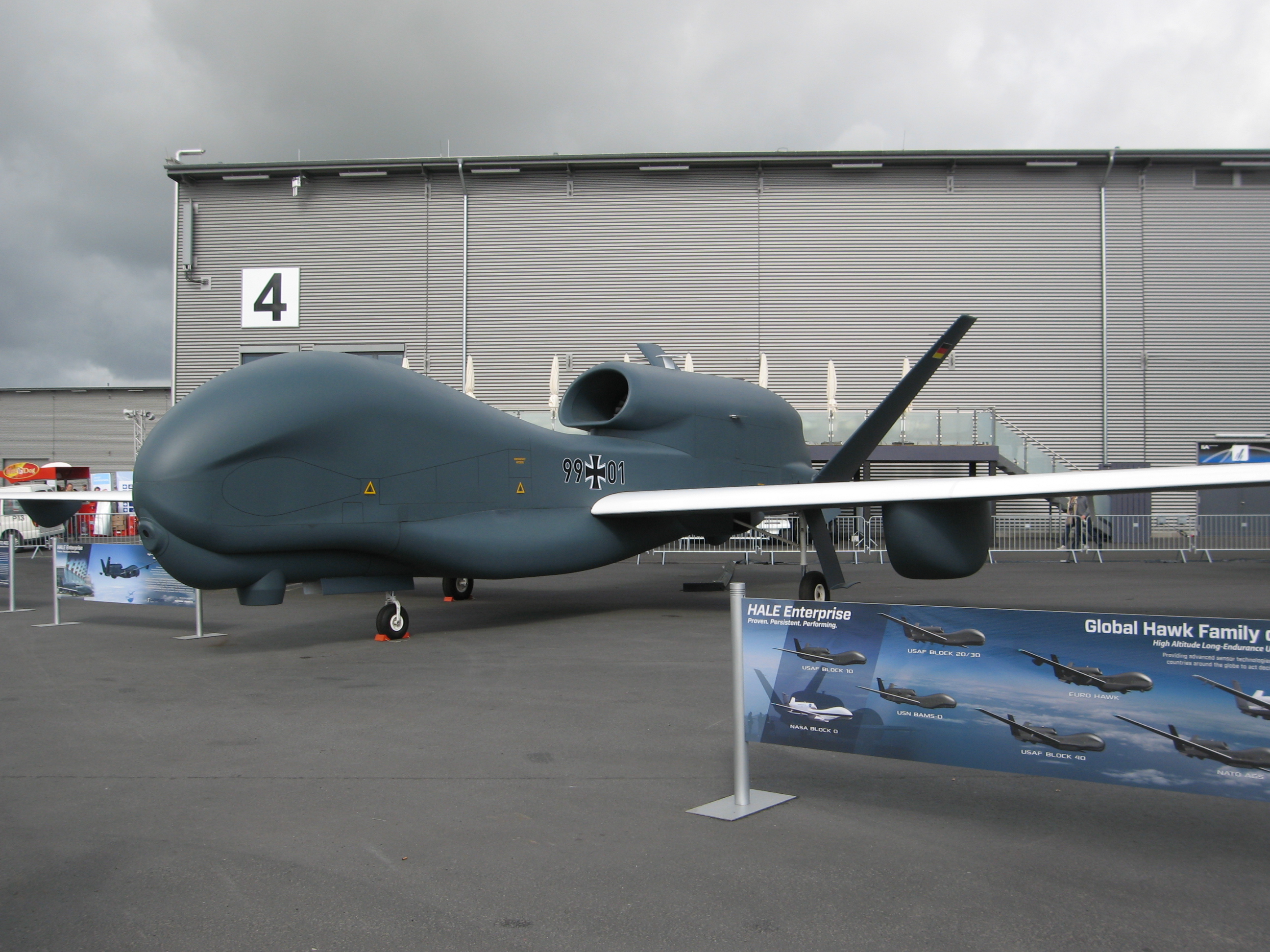In a recent Politics In Spires post, Tina Schivatcheva discusses the scandal surrounding ‘Euro Hawk’, the failed US-German drone programme. In the post, Ms Schivatcheva asserts that the German public was ‘keep[t] […] in the dark for 13 consecutive years’ regarding the surveillance drone project.
But this is incorrect. Plans for the project were officially announced at the Paris Air Show, Le Bourget, in 2001. At the Berlin Air Show ILA in 2002, the interested public could admire a full-scale mock-up of the Euro Hawk/Global Hawk, and the specialised press has reported on the deal since the early 2000s.
The general press, however, took little notice of the programme. Only when the plans began to generate costs – as for instance in 2009 when the Bundestag’s budget committee was asked to give the deal its blessing – some media outlets reported on the issue.
Therefore, Ms Schivatcheva is probably correct in that most German citizens only heard about the programme to equip Northrop Grumman’s Global Hawk airframe with German surveillance technology – thereby creating the Euro Hawk – when the project was scrapped in May 2013. When the cancellation of the project was made public, however, emotions began to run high. Many speculated whether the failed deal might lead to the resignation of German Defence Minister Thomas de Maizière, which the political opposition demanded outright. Mr Maizière was only saved by the upcoming federal elections: in the run-up, Chancellor Merkel could not afford to lose one of her most valuable ministers.
In my view, the surprising aspect of this scandal is not that the German public seemed to have known little about the deal before its untimely end. What is surprising is the enormous public interest created by the failed deal. For months after the project’s cancellation, debates of the matter did not abate and the enquiry commission asked to look into the matter received wide media coverage.
The question we should ask with regard to the affair is not, as Schivatcheva suggests, ‘how did the Euro Hawk programme escape the public gaze for so long?’, but rather ‘how can the enormous interest in the failed project be explained?’.
Explaining the outrage
The loss of taxpayers’ money does not explain the public interest on its own. The fact that the Ministry of Defence and the Bundeswehr generated expenses of €500m for a project which did not yield results is of course scandalous. But sadly the Euro Hawk is not been the first defence project to create enormous costs rather than results. And it will not be the last one.
The reason why the Euro Hawk scandal generated such a large amount of interest lies in the fact that the Euro Hawk is a drone. Indeed the project’s cancellation was made public at a time when emotions on drones were already running high.
Unmanned Aerial Vehicles (UAV) – the correct term for drones – have become one of the most covered topics in Western national and international media in recent years. At the same time, protests against UAV use have gained momentum. In the UK in the last six months alone, anti-drone groups held a protest at RAF Waddington Air Force Base in Lincolnshire, where the British Reaper-UAVs are controlled; a UAV conference had to be relocated from Bath to the secure premises of the Defence Academy because of public protests; and the ‘Campaign to Stop Killer Robots’ was launched in London. In Germany, meanwhile, Chancellor Angela Merkel saw a small UAV flown by protesters crash-land in front of her at a political event, and a group of protesters staged a protest during a German parliamentary debate on the procurement of armed drones for the Bundeswehr.
The moment of the project’s cancellation matters too. Very few people know that the Euro Hawk is not the first German drone programme to fall through. It is just the first one extensively discussed in the media. In 2002, at a cost of €168m and at a project run-time of almost 15 years, a German project to build a combat UAV — an armed drone ‘able to autonomously find, identify and attack enemy tank units, command posts and helicopters in a distance of up to 150 km — was cancelled. But in 2002, UAVs were barely known to the general public or journalists. Reporting on just another cancelled defence project seemed negligible; the US targeted killings via drones in Pakistan and Yemen had barely started and interest in the matter was low. But 2013 has been a year full of drone news, and Germany happened to be in the middle of a discussion on the procurement of armed drones, further increasing interest in the Euro Hawk.
Hence, the German public was not kept in the dark regarding the project. Rather, the increased interest in the matter, generated by international protests against drones and discussions about the arming of German UAVs, created fertile ground for media excitement. Of course, Thomas de Maizière and his Ministry need to explain why half a billion Euros has been spend largely in vain – but the public outrage has more to do with the general interest in drones than with the failed project.









No Comment